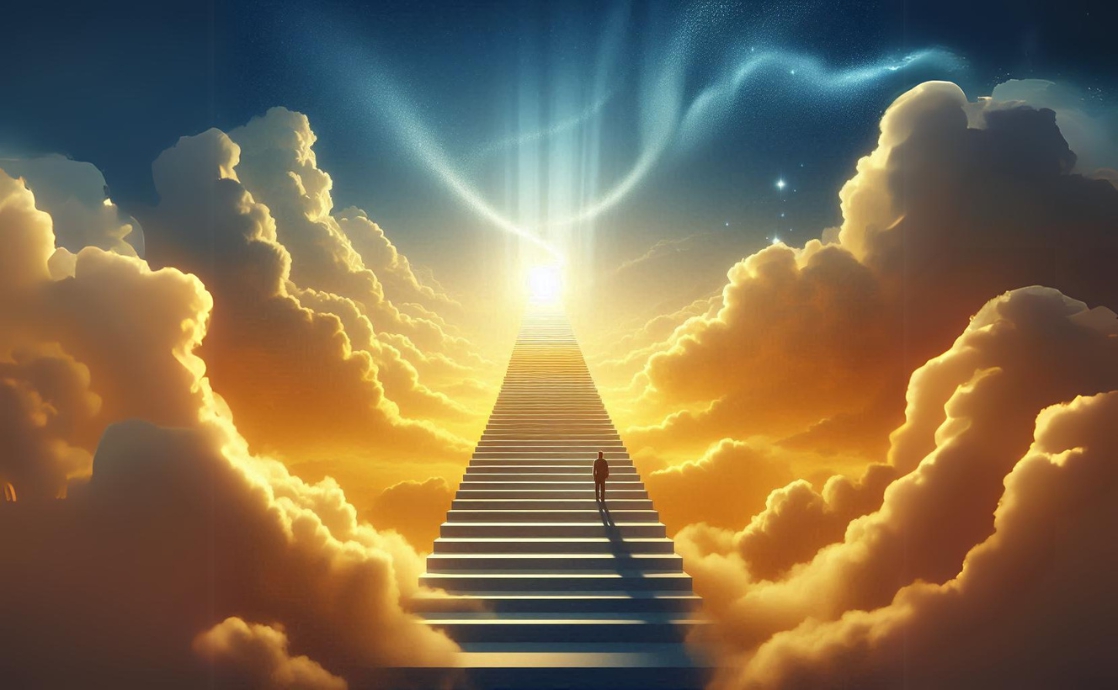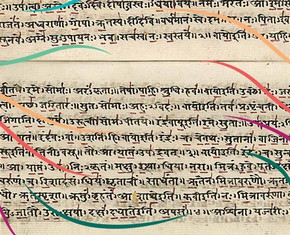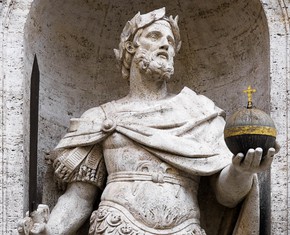The views expressed in our content reflect individual perspectives and do not represent the authoritative views of the Baha'i Faith.
As I age — and boy, do I feel it sometimes — I find myself dwelling less on this world and more on what comes next. Like many people probably do, I consistently contemplate what the afterlife might bring.
After all, we’re each closing in on the next world. Everyone will get there. No one stays here forever.
We will die. Death stalks us all and will finally claim each one of us. That inescapable fact forces us to consider what we believe: is death final, or do we have an afterlife? If death isn’t final — as every religion and most cultures believe — then what does that mean for how we conduct our lives on this plane of existence?
With all of this on my mind, I’ve begun to ask friends — and myself — this question: “Do you believe that one day you’ll stand in the presence of the Creator, who will judge the actions you’ve taken in your life?”
RELATED: Reason and the Resurrection: Can Faith Stand the Test of Science?
I’m a lot of fun at parties.
That question may seem dark or even disturbing to some folks, but not to me. After all, this basic belief — that each of us will face an individual day of judgment — has existed as long as human beings have been human.
In 400 BC, for example, Plato wrote in the last chapter of his “Republic” about “the myth of Er,” the legend of a soldier who describes the afterlife when he comes back to life following his death in battle. Plato’s soldier, named Er, recounts the main lesson he learned during his brief stay in the afterlife: moral people are rewarded after death, and immoral people are punished.
This ancient concept of reward and punishment as the chief instruments of justice underlies each religion, every legal system, and, really, all of human life. Baha’u’llah, the prophet and founder of the Baha’i Faith, wrote: “That which traineth the world is Justice, for it is upheld by two pillars, reward and punishment.”
But how do we get rewarded or punished in the next life? Will it hurt or feel wonderful? Is God merciful or just? Are we forgiven? Do we pay there for what we did here — or do we get rewarded? In this series of essays, we’ll explore those fundamental questions in light of the Baha’i teachings.
Right and Wrong, Reward and Punishment: the Basic Rule of Life
If they’re lucky enough to have a good upbringing, children learn a basic lesson of life when they’re young — the difference between right and wrong. That’s one of the primary parental jobs, to teach their offspring this lesson: if you behave well, you’ll be rewarded, and if you behave badly, you’ll be punished.
We’re punished for doing wrong — for actions that harm others or ourselves. We’re rewarded for doing right — for actions that benefit us and help humanity.
Some of the punishments for doing wrong are inherent in the general scheme of things — the laws of nature, like gravity and physics, for example, can really punish you if you ignore their dictates. Step off the roof of a building, and the consequences will become immediately apparent.
Similarly, we can try to defy human laws, but the pain of the potential civil and criminal punishments prevents most of us from taking that criminal course. After all, human civilization exists to help restrain our worst impulses and justly deal with those who give in to them.
But everyone knows that human justice is flawed, inconsistent, and often unjust. Sometimes, justice systems don’t dispense justice at all, and the worst criminals evade punishment. So is the next existence, the life of the soul in the world beyond this one, someplace where justice finally gets done?
The Baha’i teachings say yes. Abdu’l-Baha wrote that: “… reward and punishment, heaven and hell, requital and retribution for actions done in this present life, will stand revealed in that other world beyond.”
All of the major religious traditions contain this clear principle — how you conduct yourself here on Earth will greatly influence your soul’s ultimate destiny in the afterlife.
But What If I Don’t Believe in Life After Death?
Sure, lots of people believe that death means oblivion. When our bodies cease respiration and heartbeat and brain waves, it all fades to black, they maintain. That’s the nihilist position: nothing exists beyond this life.
Of course, since we cannot know, at least through our normal rational ways of knowing, that an afterlife exists, philosophers have dealt with this concept extensively.
Probably the most well-known of those philosophical formulations is Pascal’s Wager, an argument advanced in his book “The Pensees” by the 17th-century French mathematician, philosopher, and physicist Blaise Pascal. His wager goes something like this: Since we’re incapable of knowing God or knowing with absolute certainty that God exists, it behooves us to seek to believe in a Creator — because we stand to lose so much if we wager that God does not exist.
Here’s a brief summary of Pascal’s argument:
- Either God is or is not. Either life continues after death or stops. Either we live eternally or die.
- You must wager on one or the other — with your life. You already exist, so you must bet whether God exists and if your existence continues beyond the death of the body.
- Reason cannot make the decision because God, by definition, is beyond our reasoning powers.
- So it makes sense to first weigh the potential gains and losses of your wager:
- If God exists and you believe, you gain an infinite amount — eternal life and happiness.
- If God exists and life is eternal, and you decide to bet against that possibility, you will suffer enormous loss in the next world.
- If God does not exist and you decide to believe and act as though He does, you lose very little.
- Consequently, a reasonable person should believe in a Creator, seek the spiritual, plan to go on eternally and act accordingly by living as though God exists.
This deceptively simple, groundbreaking idea has caused an enormous amount of debate and discussion for the last 400 years. In fact, Pascal’s Wager created an entire field of study called Decision Theory; it marked a major advance in what is now known as Probability or Game Theory, and it contributed a great deal to entire new branches of philosophy like existentialism and pragmatism. It also represents one of the very first times a philosopher applied logic and rationality to an essentially spiritual choice.
RELATED: The Greatest Miracle of the Resurrection
Making the Decision to Believe
Pascal advised us, in his “Wager,” to make our major life decisions based on a reasonable analysis of risk and reward:
… you must wager. It is not optional. You are embarked. Which will you choose then? Let us see. Since you must choose, let us see which interests you least. You have two things to lose, the true and the good; and two things to stake, your reason and your will, your knowledge and your happiness; and your nature has two things to shun, error and misery. Your reason is no more shocked in choosing one rather than the other, since you must of necessity choose. This is one point settled. But your happiness? Let us weigh the gain and the loss in wagering that God is. Let us estimate these two chances. If you gain, you gain all; if you lose, you lose nothing. Wager, then, without hesitation that He is.
This rational way of looking at and evaluating a spiritual choice has had a profound impact on the way people think about their beliefs, bringing personal decision-making, free choice, and the independent investigation of the truth into the equation.
In Pascal’s time, this formulation was revolutionary. Unlike today, hardly anyone had the luxury of making a personal choice about religion. Instead, people were born into a rigid belief system by dint of their heritage, culture, or geographic location. The general public, without much formal education, had very limited opportunities to search out religious truth themselves and got very little choice in the matter at all.
In the Age of Enlightenment, however, things began to change. Rising educational and literacy levels meant that more and more people could make up their own minds after carefully considering the pros and cons of faith and evaluating what their own intellect and intuition told them about the truth.
So Pascal’s Wager basically asks us to analyze the purpose of our existence while admitting our lack of complete understanding and the earthbound limits of rational thought. It acknowledges the limitations of human reason but says we must rely on our decision-making abilities despite those limitations. It describes humanity as a group of finite beings surrounded by a vast universe that contains an infinite and essentially unknowable reality and says that we all find ourselves “… thrust into being from non-being for a brief life only to go out again, with no explanation whatsoever of ‘Why?’”
With both the existence and non-existence of God impossible to prove through reason, Pascal said, each person has to weigh the possible consequences of belief and make a pragmatic, rational, informed decision with those factors in mind. The stakes, both Pascal and the Baha’i teachings would agree, are high, as Abdu’l-Baha explained in his book Some Answered Questions:
… man is immortal and everlasting. Those who believe in God, who cherish His love, and who have attained certitude, enjoy that blessed life which we call life eternal; but those who are veiled from God, though they be endowed with life, yet they live in darkness and their life, in comparison with that of the believers, is non-existence.
















Comments
Sign in or create an account
Continue with Googleor